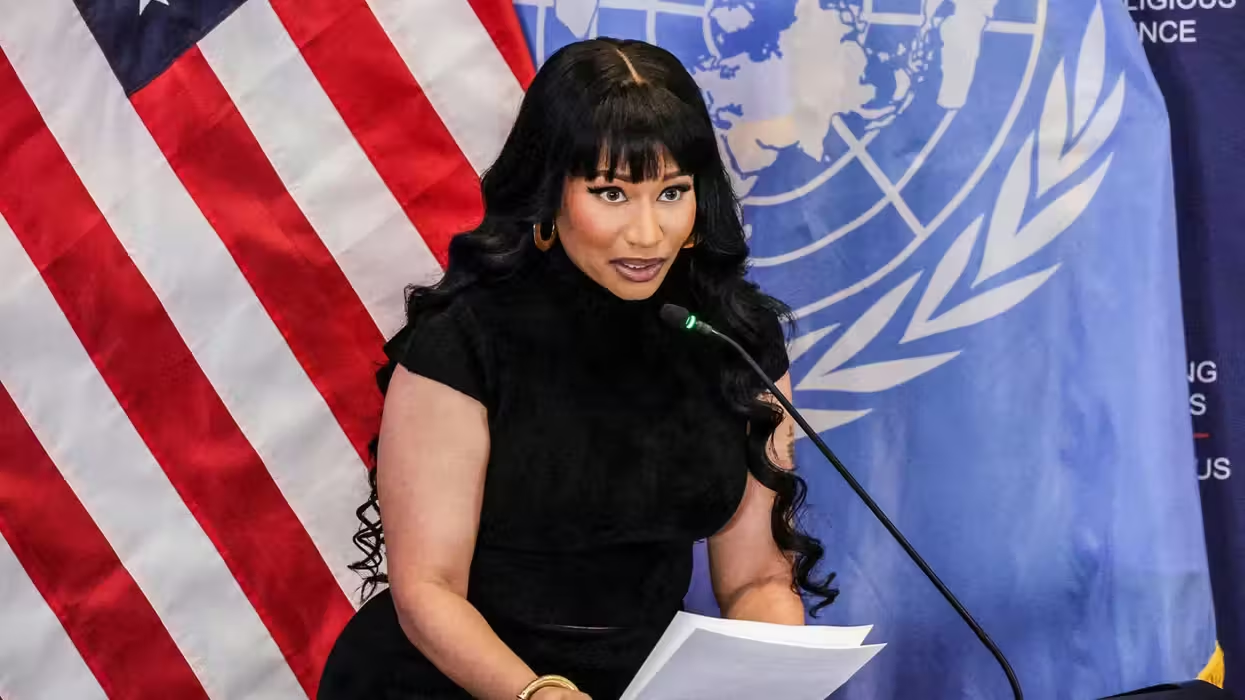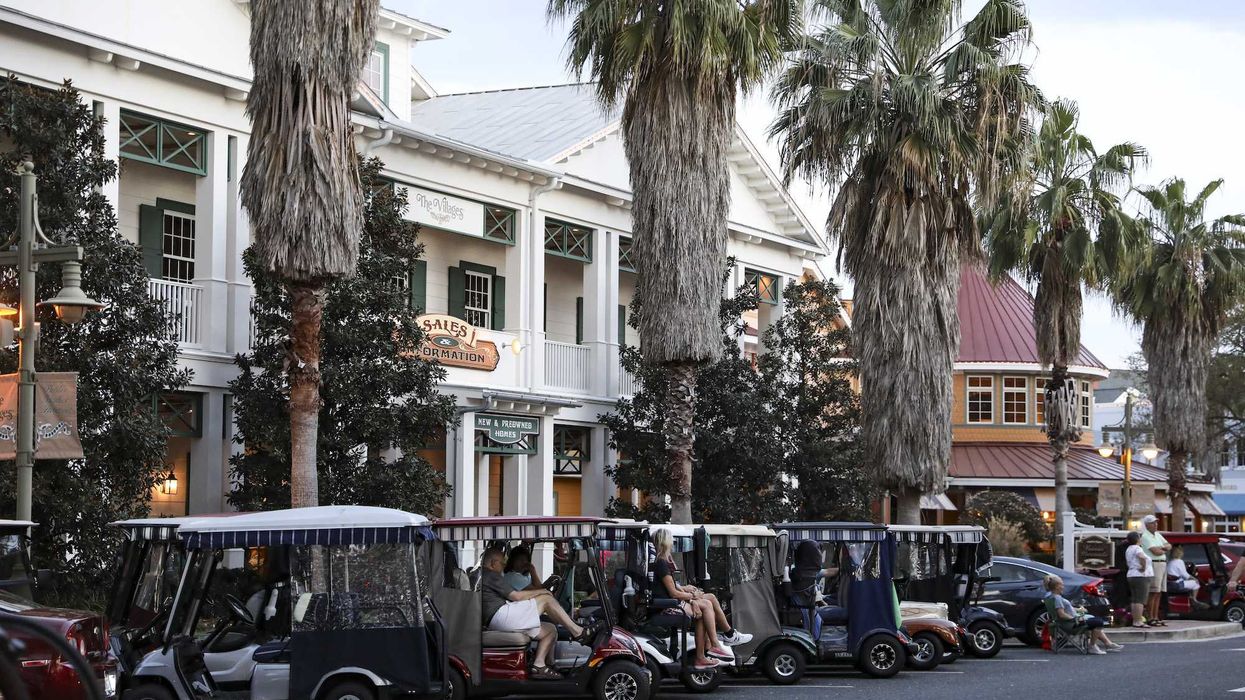CAIRO (TheBlaze/AP) -- Hundreds of thousands of opponents of Egypt's Islamist president poured out onto the streets in Cairo and across much of the nation Sunday, launching an all-out push to force Mohammed Morsi from office on the one-year anniversary of his inauguration. Fears of violence were high, with Morsi's Islamist supporters vowing to defend him.
 Opponents of Egypt's Islamist President Mohammed Morsi protest outside the presidential palace, in Cairo, Egypt, Sunday, June 30, 2013. (Credit: AP)
Opponents of Egypt's Islamist President Mohammed Morsi protest outside the presidential palace, in Cairo, Egypt, Sunday, June 30, 2013. (Credit: AP)
In a sign of the explosive volatility of the country's divisions, a hard core of young opponents broke away from the rallies and attacked the main headquarters of Morsi's Muslim Brotherhood, pelting it with stones and firebombs until a raging fire erupted in the walled villa. During clashes, Brotherhood supporters opened fire on the attackers, and activists said three protesters were killed.
 An Egyptian protester attacks Muslim Brotherhood headquarters with rocks and firebombs, sparking clashes in Muqattam district in Cairo, Sunday, June 30, 2013. (Credit: AP)
An Egyptian protester attacks Muslim Brotherhood headquarters with rocks and firebombs, sparking clashes in Muqattam district in Cairo, Sunday, June 30, 2013. (Credit: AP)
Waving Egyptian flags and carrying posters of Morsi crossed out in red, crowds packed central Cairo's Tahrir square, the birthplace of the 2011 uprising against autocrat Hosni Mubarak, thunderous chants of "erhal!" (i.e., "leave!") rang out.
 Opponents of Egypt's Islamist President Mohammed Morsi protest outside the presidential palace, in Cairo, Egypt, Sunday, June 30, 2013. (Credit: AP)
Opponents of Egypt's Islamist President Mohammed Morsi protest outside the presidential palace, in Cairo, Egypt, Sunday, June 30, 2013. (Credit: AP)
At the same time, a tidal wave of crowds marched on the Ittihadiya presidential palace, filling a broad boulevard for blocks and spilling over into nearby avenues. "You lied to us in the name of religion," some chanted, and others raised a banner proclaiming, "Morsi(equals)Mubarak. Early presidential elections." The crowds, including women, children and elderly people, hoisted long banners in the colors of the Egyptian flag and raised red cards - a sign of expulsion in soccer.
 Opponents of Egypt's Islamist President Mohammed Morsi chant slogans during a protest outside the presidential palace, in Cairo, Egypt, Sunday, June 30, 2013. (Credit: AP)
Opponents of Egypt's Islamist President Mohammed Morsi chant slogans during a protest outside the presidential palace, in Cairo, Egypt, Sunday, June 30, 2013. (Credit: AP)
 Opponents of Egypt's Islamist President Mohammed Morsi protest outside the presidential palace, in Cairo, Egypt, Sunday, June 30, 2013. (Credit: AP)
Opponents of Egypt's Islamist President Mohammed Morsi protest outside the presidential palace, in Cairo, Egypt, Sunday, June 30, 2013. (Credit: AP)
 An Egyptian protesters chant slogans and hold anti-Egypt's Islamist President Mohammed Morsi poster with Arabic reads, "Rebel and down with Muslim Brotherhood rule," during a rally in Tahrir Square, the focal point of Egyptian uprising, in Cairo Sunday, June 30, 2013. (Credit: AP)
An Egyptian protesters chant slogans and hold anti-Egypt's Islamist President Mohammed Morsi poster with Arabic reads, "Rebel and down with Muslim Brotherhood rule," during a rally in Tahrir Square, the focal point of Egyptian uprising, in Cairo Sunday, June 30, 2013. (Credit: AP)
Near Ittihadiya palace, thousands of Islamists gathered in a show of support for Morsi outside the Rabia al-Adawiya Mosque. Some Morsi backers wore homemade body armor and construction helmets and carried shields and clubs - precautions, they said, against possible violence. Their crowd also swelled as sun went down and summer temperatures became more tolerable, but they were vastly outnumbered by anti-Morsi protesters thronging main roads and thoroughfares.
The opposition's goal is to show through sheer numbers in the street that the country has turned against Morsi to pressure him out. Similarly sized crowds turned out in the Mediterranean city of Alexandria and the Nile Delta cities of Mansoura, Tanta and Damanhour, with sizeable rallies in cities nationwide.
"Mubarak took only 18 days although he had behind him the security, intelligence and a large sector of Egyptians. Morsi got all of us against him, even the army and police," said Amr Tawfeeq, an oil company employee marching toward Ittihadiya with a Christian friend. "He won't take long. We want him out and we are ready to pay the price."
 Thousands of opponents of Egyptian President Mohamed Morsi gather for a protest calling for his ouster at Cairo's landmark Tahrir Square on June 30, 2013. (Credit: AFP/Getty Images)
Thousands of opponents of Egyptian President Mohamed Morsi gather for a protest calling for his ouster at Cairo's landmark Tahrir Square on June 30, 2013. (Credit: AFP/Getty Images)
Morsi, who has three years left in his term, has said he will not step down, saying street protests cannot be used to overturn the results of a free election.
"There is no room for any talk against this constitutional legitimacy," he told Britain's The Guardian newspaper in an interview published Sunday, rejecting early elections.
If an elected president is forced out, "well, there will (be) people or opponents opposing the new president too, and a week or a month later, they will ask him to step down," he said.
As the crowds massed, Morsi's spokesman repeated the president's longstanding offer of dialogue with the opposition to resolve the nation's political crisis, calling it "the only framework through which we can reach understandings."
"I cannot imagine any substitute for dialogue," said the spokesman Ihab Fahmi. The opposition has repeatedly turned down his offers for dialogue, arguing that they were for show.
There is a sense among opponents and supporters of Morsi that Sunday is a make-or-break day, hiking worries that the two camps will come to blows, even as each side insists it won't start violence. Already at least seven people, including an American, have been killed in clashes the past week, mainly in Nile Delta cities and the coastal city of Alexandria.
But up until nightfall Sunday, violence was limited. Two offices belonging to the Brotherhood's Freedom and Justice party, were attacked and ransacked Sunday by protesters in the city of Bani Suef, south of Cairo.
 Opponents of Egypt's Islamist President Mohammed Morsi protest, some with green lasers, outside the presidential palace, in Cairo, Egypt, Sunday, June 30, 2013. (Credit: AP)
Opponents of Egypt's Islamist President Mohammed Morsi protest, some with green lasers, outside the presidential palace, in Cairo, Egypt, Sunday, June 30, 2013. (Credit: AP)
The demonstrations are the culmination of polarization and instability that have been building since Morsi's June 30, 2012 inauguration as Egypt's first freely elected leader. The past year has seen multiple political crises, bouts of bloody clashes and a steadily worsening economy, with power outages, fuel shortages, rising prices and persistent lawlessness and crime.
In one camp are the president and his Islamist allies, including the Muslim Brotherhood and more hard-line groups. Morsi supporters accuse Mubarak loyalists of being behind the protests, aiming to overturn last year's election results, just as they argue that remnants of the old regime have sabotaged Morsi's attempts to deal with the nation's woes and bring reforms.
Hard-liners among them have also given the confrontation a sharply religious tone, denouncing Morsi's opponents as "enemies of God" and infidels.
 Opponents of Egypt's Islamist President Mohammed Morsi protest outside the presidential palace in Cairo, Egypt, Sunday, June 30, 2013. (Credit: AP)
Opponents of Egypt's Islamist President Mohammed Morsi protest outside the presidential palace in Cairo, Egypt, Sunday, June 30, 2013. (Credit: AP)
On the other side is an array of secular and liberal Egyptians, moderate Muslims, Christians - and what the opposition says is a broad sector of the general public that has turned against the Islamists. They say the Islamists have negated their election mandate by trying to monopolize power, infusing government with their supporters, forcing through a constitution they largely wrote and giving religious extremists a free hand, all while failing to manage the country.
With protesters from a range of social and economic levels in a festive atmosphere, the crowds resembled those from the 18 days of protests against Mubarak - a resemblance the protesters sought to reinforce, chanting the slogan from that time: "The people want to topple the regime."
 Opponents of Egypt's Islamist President Mohammed Morsi protest near the presidential palace, in Cairo, Egypt, Sunday, June 30, 2013. (Credit: AP)
Opponents of Egypt's Islamist President Mohammed Morsi protest near the presidential palace, in Cairo, Egypt, Sunday, June 30, 2013. (Credit: AP)
In Cairo, some marchers carried tents, planning to camp in Tahrir or outside the palace. Residents of nearby buildings sprinkled water down on the marchers to cool them in the punishing summer heat and waved flags and blew whistles in support.
"The country is only going backward (under Morsi). He's embarrassing us and making people hate Islam," said Donia Rashad, a 24-year-old unemployed woman who wears the conservative Islamic headscarf. "We need someone who can feel the people and is agreeable to the majority," added Rashad, who wore a tiny tiara in the letters of "erhal."
"Today is the Brotherhood's last day in power,

 Opponents of Egypt's Islamist President Mohammed Morsi protest outside the presidential palace, in Cairo, Egypt, Sunday, June 30, 2013. (Credit: AP)
Opponents of Egypt's Islamist President Mohammed Morsi protest outside the presidential palace, in Cairo, Egypt, Sunday, June 30, 2013. (Credit: AP)






